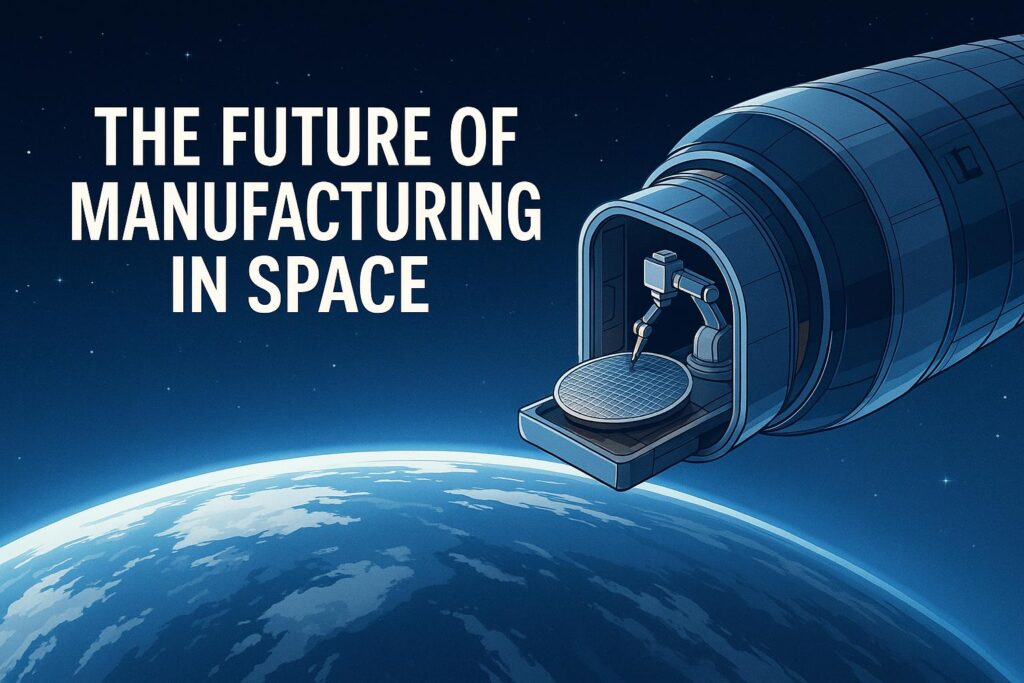6 May 2025 — The concept of manufacturing in space, once a staple of science fiction, is rapidly becoming a tangible reality. Advancements in technology and a significant reduction in launch costs have paved the way for companies to explore the unique advantages of producing materials in microgravity environments.

Harnessing Microgravity for Superior Manufacturing
The microgravity conditions of space offer unparalleled opportunities for manufacturing processes that are challenging on Earth. In the absence of gravity, materials can be processed with fewer imperfections, leading to higher-quality products. This environment is particularly beneficial for the production of semiconductors, pharmaceuticals, and advanced materials.
Jessica Frick, CEO of California-based Astral Materials, is at the forefront of this movement. Her company is developing compact furnaces designed to operate in space, capable of reaching temperatures around 1,500°C. These furnaces aim to produce ultra-pure semiconductor crystals and other high-value materials. Frick describes their mission succinctly:
“We’re building a box that makes money in space.”
Similarly, UK-based Space Forge is exploring the potential of space-based manufacturing. CEO Joshua Western highlights the limitations of Earth-bound semiconductor production:
“Silicon now has an unsolvable problem. We basically can’t get it any purer.”
By utilising the microgravity environment, Space Forge aims to produce higher-quality semiconductor wafers, potentially revolutionising the electronics industry.
Medical Advancements Beyond Earth
The benefits of space manufacturing extend to the medical field. Varda Space Industries, a California-based firm, has successfully conducted missions to grow crystals of the antiviral drug ritonavir in space. These missions demonstrate the potential for producing pharmaceuticals with enhanced efficacy and purity. Eric Lasker, Varda’s Chief Revenue Officer, emphasizes the impact:
“It can really help people down here.”
Furthermore, Redwire, a Florida-based company, is investigating the fabrication of human organs in microgravity. Mike Gold, President of Civil and International Space Business at Redwire, explains:
“When you shut off gravity, you’re able to fabricate something like an organ. If you try to do this on Earth, it would be squished.”
Scaling Up: The Vision for Orbital Factories
As the feasibility of space manufacturing becomes evident, companies are envisioning larger-scale operations. The concept of orbital factories—dedicated facilities in space for manufacturing—is gaining traction. These factories could operate continuously, leveraging the unique conditions of space to produce materials and products for use both in space and on Earth.
Mike Curtis-Rouse, Head of In-Orbit Servicing, Assembly, and Manufacturing at the UK-based Satellite Applications Catapult, projects significant growth:
“By 2035, the anticipation is that the global space economy is going to be a multitrillion-dollar industry, of which in … .”
Asteroid Mining: The Next Frontier
Looking further ahead, the prospect of sourcing raw materials directly from space is becoming more plausible. Companies like AstroForge are preparing to test technologies for asteroid mining, aiming to extract valuable metals such as platinum, nickel, and cobalt. These resources could then be used in space-based manufacturing processes, reducing the need to transport materials from Earth and minimising environmental impact.
Challenges and Considerations
Despite the promising outlook, space manufacturing faces several challenges. These include the high costs associated with launching equipment into space, ensuring the safe return of manufactured goods to Earth, and navigating the complex regulatory landscape governing space activities. However, continued advancements in technology and increasing investment in the sector are expected to address these hurdles over time.

Conclusion
The emergence of space-based manufacturing represents a significant shift in industrial capabilities, offering the potential for higher-quality products and new economic opportunities. As technology continues to advance and the space economy expands, manufacturing in space may become an integral part of various industries, from electronics to medicine. The journey is just beginning, but the trajectory points toward a future where the final frontier becomes a bustling hub of innovation and production.



